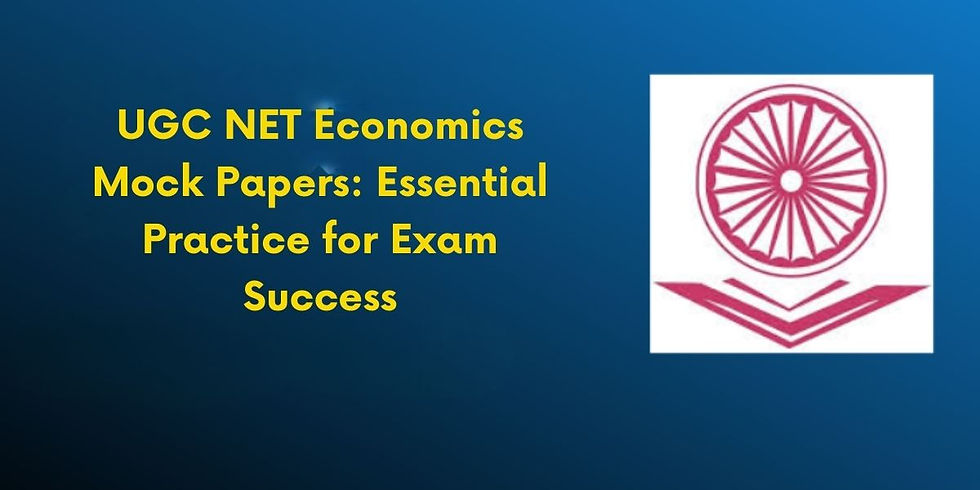Best Study Materials Provided in UPSC Economics Optional Coaching
- ArthaPoint
- Sep 8, 2025
- 4 min read
If you’ve ever prepared for UPSC, you already know how overwhelming it feels. The moment you decide on your optional subject, a flood of books and resources comes your way. By the end of the week, your table is buried under notes, photocopies, and PDFs. And instead of feeling confident, you feel scattered.
I’ve seen this happen especially with Economics optional. The subject is rich, analytical, and deeply rewarding. But it can also trap you in endless reading. That’s where the study materials from UPSC Economics Optional Coaching become a lifesaver. They don’t just give you content—they give you direction.
Why Materials Make or Break Your Prep
Let me put it this way. UPSC doesn’t reward the person who has read the most. It rewards the person who has understood the syllabus the best.
The right study materials:
Save you from drowning in irrelevant books.
Break complex theories into easy ideas.
Link economics with current affairs so answers feel alive.
Cut revision time in half.
Think about it—would you rather keep flipping through random sources or sit down with one set of notes that gives you everything in order?
What You Actually Get
When you sign up for serious coaching, the material you receive isn’t just a pile of handouts. It’s a carefully designed kit that matches the syllabus line by line.
You get notes for both Paper 1 and Paper 2. Theories are explained in simple language, with graphs and diagrams that you can actually remember. Even heavy textbooks like Samuelson or Blanchard are condensed into crisp summaries, so you don’t lose months trying to decode them.
And then comes the Indian economy section—the part that feels most relevant. Budget highlights, RBI policies, government schemes, Economic Survey insights—all presented in a way that ties directly into your answers. Suddenly, writing about growth or inflation doesn’t feel like copying from a textbook. It feels like explaining the news with a theoretical twist.
International economics is also handled with the same clarity. Trade agreements, Balance of Payments, globalization, WTO negotiations—these aren’t just listed, they’re explained in a way that shows you how to use them in the exam.
And of course, no material set is complete without practice papers. You get solved previous year questions, model answers, and practice sets that prepare you for the real thing. It’s like rehearsing before the actual performance.
The Extras That Count
What separates good study material from ordinary ones are the extras. Weekly updates that connect theories to current issues. Case studies from IMF and World Bank reports. Infographics and mind maps that let you revise an entire topic in minutes.
These may seem like small things, but when hundreds of aspirants are writing the same exam, small things are what make your paper stand out.
The Confidence Factor
I’ve noticed this again and again. Aspirants who use curated notes walk into the exam hall calmer than others. Why? Because they’re not carrying the weight of confusion. They know exactly what to write, how to structure answers, and which examples to use.
Confidence in UPSC doesn’t come from reading everything. It comes from knowing you’ve read the right things.
The Trap of Random PDFs
Let’s be honest. We’ve all downloaded free PDFs in the name of preparation. But most of them are either outdated or poorly structured. Instead of saving time, they waste it.
Curated coaching materials are the opposite. They’re updated, exam-oriented, and designed to match how UPSC frames its questions. In a high-stakes exam, that reliability is priceless.
Using the Notes the Right Way
Of course, even the best notes won’t help if you treat them like novels. You have to work with them. Revise them multiple times. Practice writing answers every day. Draw diagrams wherever you can. And always connect points with current affairs.
This is how toppers do it. They don’t just read—they practice until the material becomes second nature.
Lessons from Toppers
If you listen carefully to toppers, you’ll notice one thing: almost all of them stress on clarity. Many admit they wasted their first attempt trying to read everything. Following carefully chosen notes was ultimately what proved effective. After she stopped gathering resources and focused just on structured coaching materials, I can think of one candidate who passed the UPSC. because his responses included examples and graphs directly from the modules.Their stories prove a simple truth: clarity beats clutter.
Final Word
UPSC is already a marathon. Why run it with weights tied to your feet? Economics optional can be a scoring subject, but only if you prepare smartly. The right study materials are not just notes. They’re your map, your toolkit, your safety net.
They save you time. They give you focus. They help you write answers that look sharp and relevant. Most importantly, they give you the peace of mind that you’re not missing anything crucial.
So, if you’ve chosen Economics, don’t just rely on luck or scattered resources. Trust curated coaching notes. They’re not magic, but they are the closest thing to a shortcut in this long, demanding journey.
Because when the exam day comes, wouldn’t you rather walk in with clarity than with doubt?





Comments